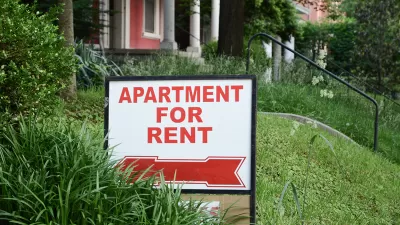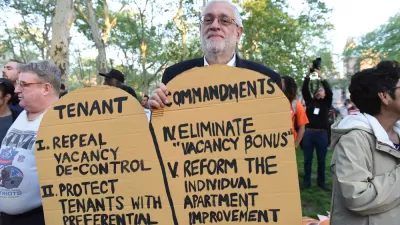Voters in Santa Rosa, California rejected a measure that would have retained the rent and eviction control ordinance that the city council had approved lasted August. The referendum was placed on the ballot by the California Apartment Association.

Santa Rosa, the Bay Area's fifth largest city (pop: 174,000) and county seat of Sonoma County, held a special election on June 6 to determine whether to retain or reject the rent-and-eviction-control ordinance which the city council had approved on a 4-2 vote last August.
Measure C, which would have retained the rent stabilization ordinance, was rejected by 52.5 percent of voters.
After the council passed the ordinance last August, the "California Apartment Association responded with a signature-gathering effort to place the ordinance before Santa Rosa voters," according to the association. "After the referendum qualified, the City Council in January called for the special election."
"What’s unusual about Santa Rosa is that it’s not considered a major tech hub, where high-paying jobs are often blamed for skyrocketing rents and evictions," observes Kathleen Pender for the San Francisco Chronicle. "About 48 percent of the city’s households are renters."
In November, voters approved rent control in Mountain View (home to Google and Intuit), but turned it down in San Mateo and Burlingame. [Rent and eviction controls were on the November 2016 ballot in six Bay Area cities.].
Pacifica [San Mateo County] voters will decide in November whether to make permanent a temporary rent-control ordinance that its council passed 3-2.
Rents have been rising in this county on the northern edge of the nine-county Bay Area. "Joshua Howard, a senior vice president with the apartment association, said Santa Rosa has fallen much shorter than other Bay Area cities 'in permitting and getting built the housing units needed to sustain' its growing population," adds Pender.
FULL STORY: Rent control loses a battle in Santa Rosa, but war rages on

Planetizen Federal Action Tracker
A weekly monitor of how Trump’s orders and actions are impacting planners and planning in America.

Chicago’s Ghost Rails
Just beneath the surface of the modern city lie the remnants of its expansive early 20th-century streetcar system.

San Antonio and Austin are Fusing Into one Massive Megaregion
The region spanning the two central Texas cities is growing fast, posing challenges for local infrastructure and water supplies.

Since Zion's Shuttles Went Electric “The Smog is Gone”
Visitors to Zion National Park can enjoy the canyon via the nation’s first fully electric park shuttle system.

Trump Distributing DOT Safety Funds at 1/10 Rate of Biden
Funds for Safe Streets and other transportation safety and equity programs are being held up by administrative reviews and conflicts with the Trump administration’s priorities.

German Cities Subsidize Taxis for Women Amid Wave of Violence
Free or low-cost taxi rides can help women navigate cities more safely, but critics say the programs don't address the root causes of violence against women.
Urban Design for Planners 1: Software Tools
This six-course series explores essential urban design concepts using open source software and equips planners with the tools they need to participate fully in the urban design process.
Planning for Universal Design
Learn the tools for implementing Universal Design in planning regulations.
planning NEXT
Appalachian Highlands Housing Partners
Mpact (founded as Rail~Volution)
City of Camden Redevelopment Agency
City of Astoria
City of Portland
City of Laramie





























